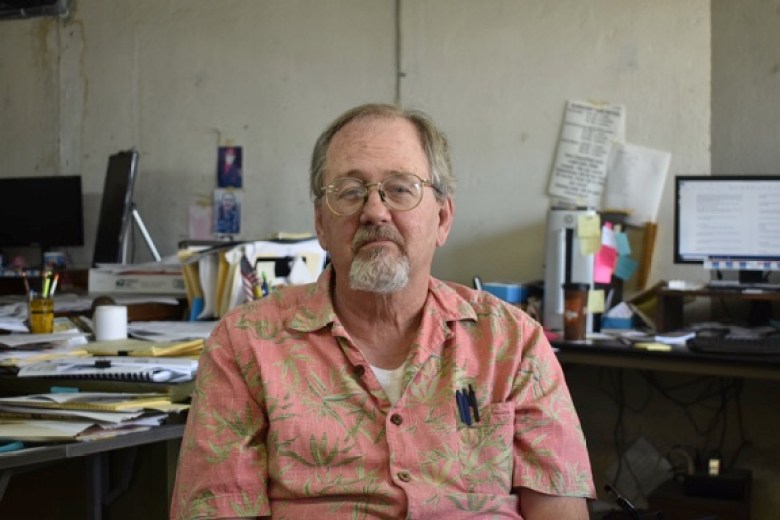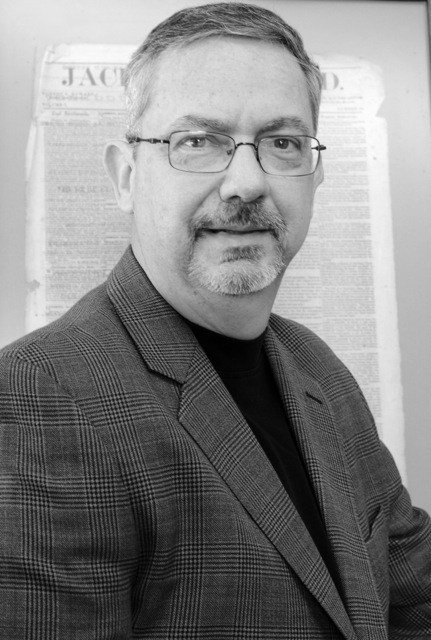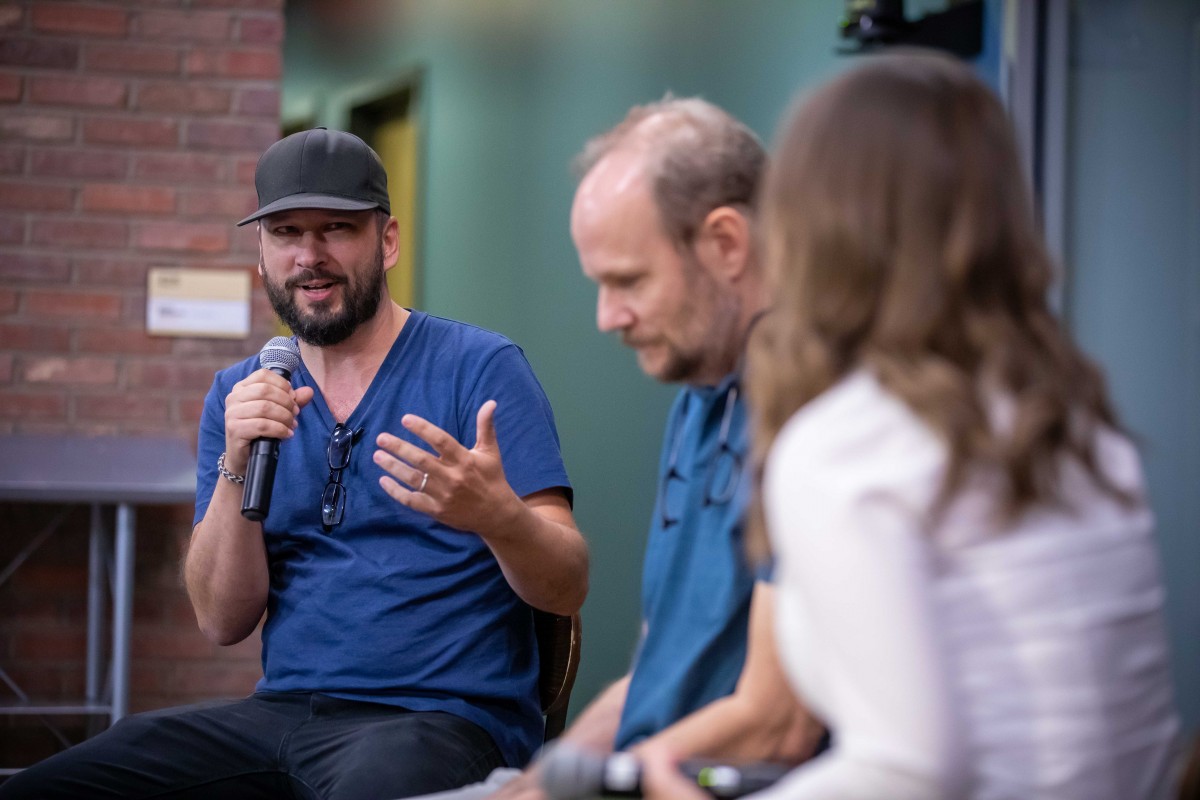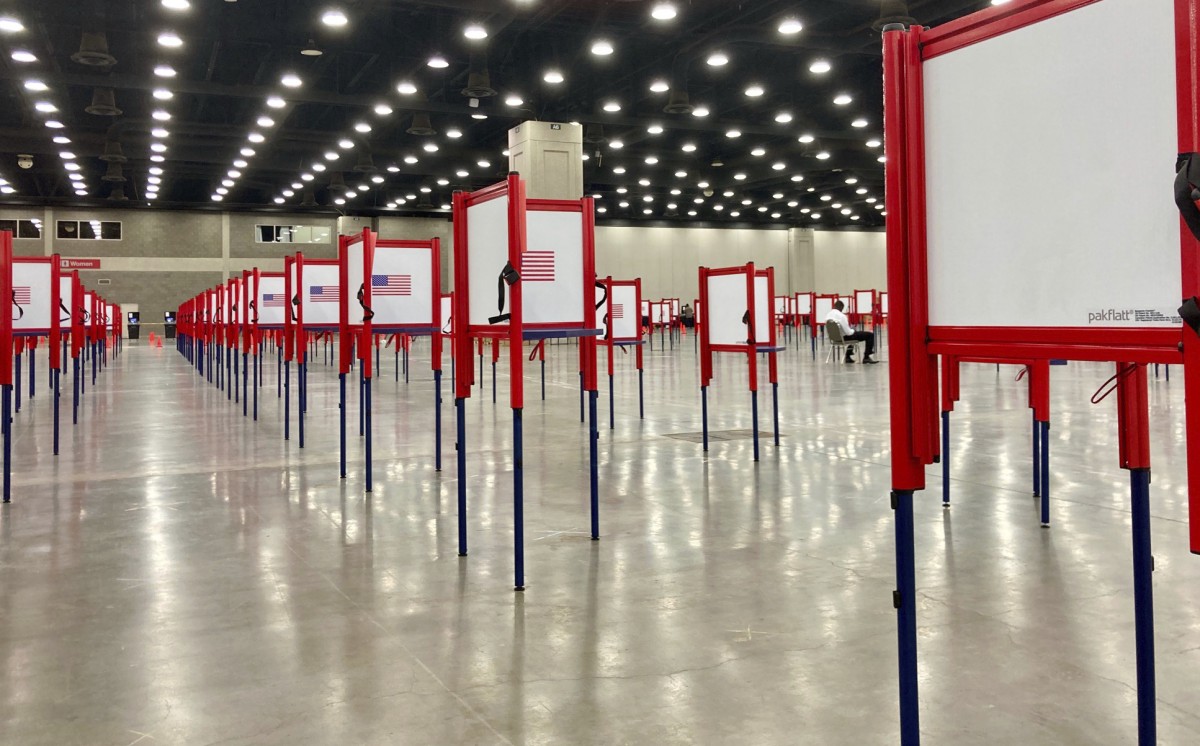With the epidemic still burning through the country and public trust in the media at an all time low, rural journalists struggle with added pressures and mental stress of the new and dangerous reality they help cover in the news.
On a typical day, a council meeting in a cramped government conference room would not be a big deal.
But this wasn’t a typical day. This was in the midst of a pandemic, and no one was wearing masks. Except Ashley Spinks.
“I’d been writing about wearing masks, but no one was wearing them,” she said. “And I knew that my mask wasn’t protecting me. It was protecting them.”
Spinks is the editor at the Floyd Press, a weekly newspaper in Floyd, Virginia, a town of about 500 people. Like many rural news organizations, she’s “it” when it comes to editorial staff. As the editor and reporter, it’s her responsibility to get the news to the residents of her community, and to get it right.
Even if that means facing exposure to the virus in a mask-less council meeting.
As rural communities grapple with the COVID-19 pandemic, their local newspapers work to keep them informed. But that work may be taking its toll on their mental and emotional health.
For Spinks, like so many other rural journalists, keeping her community informed means covering stories during the day, covering government meetings at night, and covering events on the weekend. The job is not 9 to 5, Monday through Friday, during even the best of times.
In mid-March, Spinks said, when the pandemic really began, she covered it as best she could.
“I’d publish every piece of information from the Virginia Department of Health that I could get my hands on,” she said. “But after a while, there wasn’t much new I could say. It is still a really important story, but Floyd County is really rural, as are the surrounding counties, and we just weren’t getting enough cases to have it be the only thing we covered.”
News turned from the pandemic to the resulting indirect impact it was having on her community. Events were cancelled. Mask debates flared up. School re-openings were hashed out by officials. Government meetings went online.
Still, she tried to cover both the pandemic and other news – good stories that were happening in the community, as well as a series called “My First Job,” where she talked to community leaders about their memories of their first jobs.
The pandemic and government actions to halt COVID-19’s spread caused division in her community. Community members lashed out at her online. Small businesses, closed during shut downs, couldn’t advertise, which caused financial strain at the paper. A spike in cases overnight led her to cancel plans for her October wedding.
“We had 19/20 new cases in one day,” she said. “I thought it might not be safe to bring my family here.”
The emotional and mental strain of the past six months has had an effect on her, she said.
And the spike in cases has left her frustrated.
“That’s when it came home to roost for me. Our job is to get information to people with good actionable data,” she said. “Either people weren’t reading it, or they were ignoring it.”

The realization that things were not getting better led her to question her chosen profession.
“It created sort of a crisis of faith in me – what is the value of my work if people don’t want to listen to it?” she said. “I would say by nature, I’m anxious. But this has been more depression. I just have this deep sadness at the way we’re treating each other. Some of the commentary I get on my stories and the way people talk to each other at public meetings…I feel really disheartened and disappointed in my small town. Small towns are not supposed to be like this.”
A recent study by the Reuters Institute for the Study of Journalism and the University of Toronto found that more than two-thirds of journalists they surveyed reported being emotionally and mentally affected by covering the pandemic.
Researchers asked 73 journalists from international news organizations about their mental and emotional state while working on stories related to the pandemic.
Dr. Anthony Feinstein, a neuropsychiatrist and professor of psychiatry at the University of Toronto, and Meera Selva, director of the Journalist Fellowship Programme at Reuters Institute for the Study of Journalism, found that nearly 70 percent of the journalists who responded to the survey say they suffer from some level of psychological distress. Moreover, their responses, the researchers say, suggests that 26 percent of the respondents have symptoms of significant anxiety compatible with Generalized Anxiety Disorder such as worry, insomnia, poor concentration and fatigue.
The study also found that 11 percent of the respondents reported symptoms of post-traumatic stress disorder including recurrent intrusive thoughts of a traumatic COVID-19-related event, and feelings of guilt, fear, anger, horror and shame.
Globally, more than 60 journalists have died of COVID-19, according to the Poynter Institute, including: Alison Schwartz, 29, director of digital platforms at People Magazine; Anthony Causi, 48, a photojournalist with the New York Post; and Mark Eckert, an executive at Mahoning Matters, in Youngstown, Ohio.
At larger news organizations, human resources departments and employee assistance programs can help employees cope. But at smaller companies, like rural newspapers, those resources may not exist, said Tyler Arvig, PsyD, LP, and associate medical director at R3 Continuum, a workplace wellness consulting company.
“What we’re seeing is that generally with essential workers, and (members of) the press are essential workers because the news has to get out there, … is that people are really struggling with this,” he said. “This is an industry with a lot of stress, but now there’s increased stress, and increased financial strain as newspapers struggle to stay open.”
The effects of the pandemic on reporters and their news outlets will continue to be felt for some time, he said.
For Marcia Martinek, editor emerita of the Herald Democrat of Leadville, in Colorado, COVID-19 hit just as she was transitioning away from being the editor of the Herald and bringing a new editor. It was supposed to be a time where she could slow down and work on the stories she wanted to work on.
More than 10,000 feet above sea-level, Leadville is home to just under 2,800 people. Two hours west of Denver, it is the county seat of Lake County, Colorado, and home to the highest point in the Rocky Mountains, the summit of Mount Elbert.
Martinek said she had hoped it would be a smooth transition as the new editor took over and a new reporter came on board. But when the pandemic started, she stepped back in to help.
“It was not necessarily depression and anxiety. I would say there’s a lot more stress,” she said. “Although I do feel a bit depressed, but I think I felt that because I wasn’t the editor anymore.”
The isolation brought on by social distancing and other responses to the pandemic added to those feelings. All but one team member began to work from home. Phone calls, emails and Zoom sessions took over face-to-face meetings.
To cope, the staff of the newspaper began to gather in a small group at one of their homes for happy hour and margaritas.
“I think it really made a difference, just to have that human contact,” she said. “When we were all meeting together, we were a team. And we’ve always been a team. It was just so nice to be able to talk to someone. I think that did help me and other people in the office.”

In Centerville, Tennessee, Bradley Martin, editor of the Hickman County Times, has been in the routine of working alone for 34 years. As the editor and reporter for the paper, he said the stress of not having colleagues to talk to and of finding enough news to fill the paper is something he’s used to.
Hickman County has just over 25,000 residents. Located about an hour southwest of Nashville, it’s in part a bedroom community for commuters to the city. Martin said his community tends to be on the older side, so most people are staying in. Only about 100 cases of COVID-19 have been reported in the county, he said.
There’s not a sense of anxiety or depression, he said, but more of a sense of increased pressure because of the speed in which things change.
“I’ve been doing this here for a long time,” he said. “This is definitely keeping me on my toes. Everything is a little more complex. With schools talking about re-opening, the questions were ‘Can we open?’ ‘Should we open?’ and ‘How do we open?’ They came up with three different plans. Just keeping up with all those details was the hard part.”
But Mike Buffington, editor of the Jackson Herald, in Jefferson, Georgia, said more than just COVID is to blame.
“I think it’s a combination of things,” he said. “I think even before the virus there was a kind of this atmosphere of doom and gloom (because of cutbacks and lay-offs in newsrooms) across the industry. And then you have people coming up to you saying, ‘Well, I saw this on Facebook. I get my news from Facebook now.’ And then, of course, the political attacks on the news media where the media gets blamed for all the political and cultural ills in the country. So, I think a lot of that was already in the atmosphere. And then the virus hit.”
The Jackson Herald is part of Main Street News, a group of five newspapers covering counties in northeast Georgia near Athens. Some of the paper cover more urban areas, and some are more rural, Buffington said.
The economic impact of COVID meant streamlining and condensing operations at the newspapers, transitioning some employees to part-time and laying off some staff. And it meant making plans in case anything went wrong. The papers’ editors designated one senior sports editor as “the designated survivor.”
“We told him, ‘You work from home. Don’t go anywhere. The rest of us are going to cover meetings and do whatever we have to do. And if anybody gets sick, your job is to step in and make sure the paper, whichever paper it is, you become that paper’s editor for the time being’,” he said.
While one or two of his employees have told him they’re struggling with the dynamics of all of the changes – financial and otherwise – there hasn’t been a lot of talk about employees’ mental health, he said.
For him, the pandemic has him in a position he never thought he’d be in.

“I guess none of us saw this coming,” he said. “You know, I never anticipated at 61 that something like this would happen. I was looking to start slowing down, not on speeding up. I think it has kind of whiplashed all of us to some extent. Like I say, some of the younger reporters who have not been through other storms may be struggling a little bit more having not kind of gone through something like this before. But I’ve been through stuff and recessions and downturns before, so I’m a little more confident that while this is pretty bad, we’ll find a way to survive.”
Psychologist Arvig said the key for rural reporters to cope with the stresses and emotional strains brought on by COVID-19 is to try to disengage from work and get involved with something else.
“It’s important for reporters to have a shut-off point where they can get around dealing with COVID,” he said. “They need to be asking themselves, ‘What can I do to build a few minutes into my day to step away. Where can I find 15 minutes to go for a drive?’”
And because those in the media often have family members who ask them about the stories they’re working on, Arvig recommended journalists set boundaries so that they can shut down and not have to think about the pandemic.
To help her cope with the emotional and mental impact of COVID, in Floyd County, Spinks said she relies on yoga and her weekly Unitarian Universalist Church services, both held outside, and appropriately social distanced.
“My faith ties me to a community,” she said. “It helps me not feel like I’ve been jettisoned out into a sea of despair.”
This article was originally published by the Daily Yonder.



